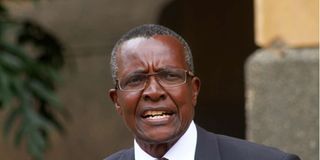Maraga mulls plan to dissolve House over gender rule

Chief Justice David Maraga during a Press conference at the Supreme Court in Nairobi on June 8, 2020.
What you need to know:
- While plans for such a transmission are afoot, there is anxiety in the Judiciary that the CJ’s action could be misinterpreted in the current polarised political climate in the country.
- There are also questions as to whether President Kenyatta will act on the recommendation, given his past relationship with Mr Maraga and the judiciary.
According to Mr Kitonga, there is a likelihood that if the CJ’s recommendation comes to pass it will be challenged in court.
Chief Justice David Maraga could be preparing for possibly his last major act before he retires early next year, with an imminent recommendation to President Uhuru Kenyatta to dissolve parliament for its failure to enact a law on gender balance.
Judiciary sources told the Sunday Nation that Mr Maraga could transmit his recommendation to the President mid this week after he received at least six petitions calling for the dissolution of parliament.
Mr Maraga will be retiring in January 2021.
Such a move, with huge constitutional and political ramifications, could only rank second to the decision by a majority of the Supreme Court judges which nullified the August 2017 presidential election result. The CJ was on the majority side, which invalidated President Kenyatta’s re-election and called for a repeat poll on October 26 which the opposition boycotted and Jubilee candidate won.
The CJ has petitions from the Law Society of Kenya, former Marakwet West MP David Sudi, Margaret Toili, Fredrick Mbugua, Bernhard Aoko and Stephen Owoko. They all argue that parliament has deliberately refused to enact the law.
Polarised political climate
While plans for such a transmission are afoot, there is anxiety in the Judiciary that the CJ’s action could be misinterpreted in the current polarised political climate in the country. There are also questions as to whether President Kenyatta will act on the recommendation, given his past relationship with Mr Maraga and the judiciary.
The appointment of 41 people recommended by the Judicial Service Commission (JSC) as judges is still pending as President Kenyatta seeks an opening to have a greater say in the recruitment of judges. Budget constraints in the judiciary have increased.
“From a constitutional standpoint, once the Chief Justice transmits his recommendation, the President is bound to act, and the Constitution allows him to act in one way only. That is something that has serious constitutional, legal and political consequences and the President would need to consult far and wide, including with the political leadership. But as to whether this president can follow through on the CJ’s recommendation is another matter,” lawyer Nzamba Kitonga told the Sunday Nation.
According to Mr Kitonga, there is a likelihood that if the CJ’s recommendation comes to pass it will be challenged in court.
Saturday, neither Mr Maraga nor the Chief Registrar of the Judiciary Anne Amadi responded to the Sunday Nation’s queries.
Contravened Constitution
The enactment of the two-thirds gender principle was among the things parliament was to do within five years after the promulgation of the Constitution. Ten years down the line,, it hasn’t and four attempts by the National Assembly were defeated.
The last attempt on February 27, 2019 failed after the proponents of the bill could not raise the requisite quorum of 233 MPs to vote. LSK in its petition of July 17, says parliament has contravened the Constitution “by neglecting, refusing, and/or failing to perform its constitutionally imposed obligation to realise the two-thirds gender rule.”
Mr Maraga met with the LSK Council and advised them to serve the Speakers of the Senate and National Assembly.
In their responses, the two clerks of the Houses Michael Sialai and Jeremiah Nyegenye opposed the petition, questioning the CJ’s jurisdiction to recommend the dissolution of parliament, adding that it is impracticable to enact the two-thirds gender principle. They said there is no clarity as to how a by-election would be held if parliament were dissolved under such circumstances.
LSK president Nelson Havi has accused the two clerks of “putting in sloppy responses,” leaving the CJ with a simple decision.
But dissolving parliament at this juncture means that President Kenyatta will have prematurely ended his final term in office two years early.. In a House as divided as Jubilee Party, the prospect of dissolving Parliament is a double-edged sword.
There are no timelines as to when the President should act on such a recommendation, though lawyer Nzamba Kitonga says that the courts have developed guidelines on ‘reasonable time’ where the Constitution has not provided one. Such a recommendation could give the President yet another opportunity to deal with Jubilee MPs who have continuously defied him.





